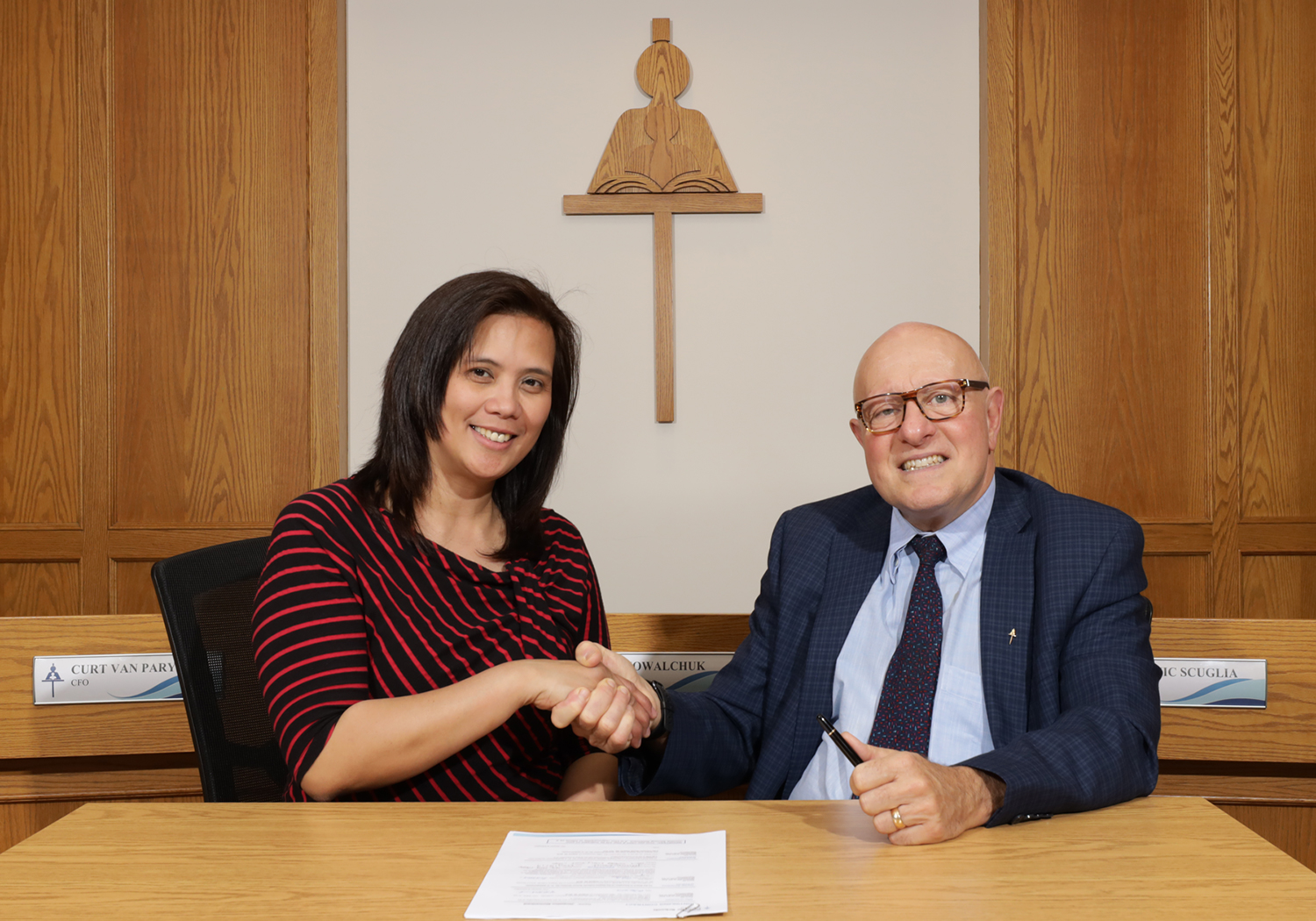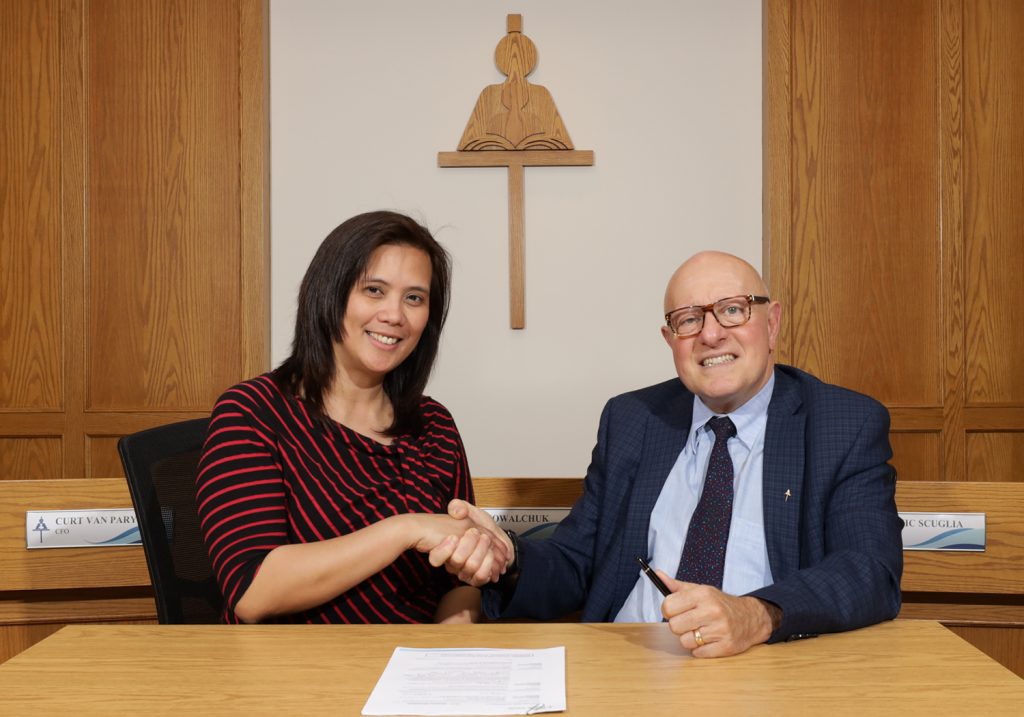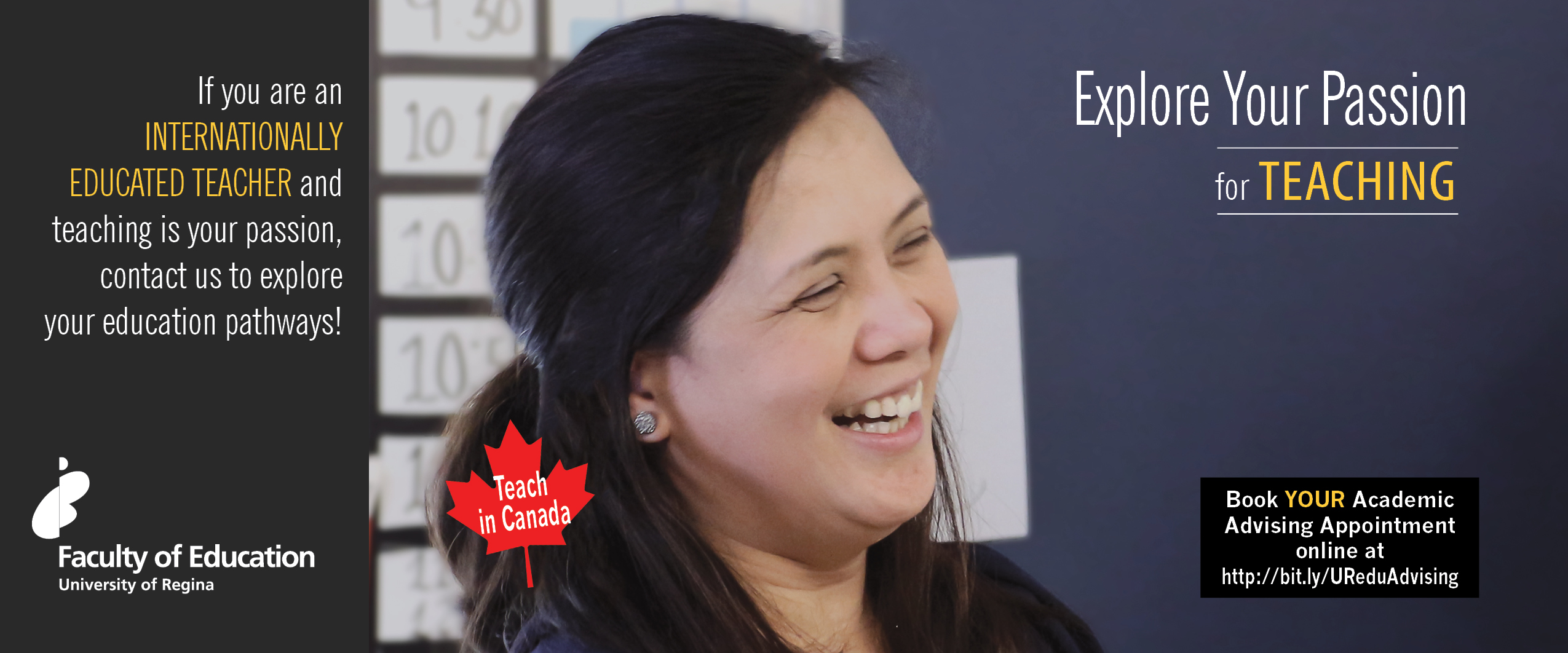
Anna Lucero was a teacher in the Philippines for 15 years before moving to Canada. After taking three University of Regina courses, and her TESOL language test, she was eligible for her Saskatchewan teaching certificate. She is now teaching elementary students in Regina and is also a lecturer for elementary math education at the University of Regina. Her work as a teacher in Canada has exceeded her expectations and hopes.
Not long before moving to Canada, Anna had landed her dream job of teaching at an exclusive school in the Philippines: “The position in the Philippines was like a birthright. You had to wait for someone to retire to get such a position.” Over the 15 years of teaching elementary school mathematics, Anna had worked to prove herself capable of such a position, taking master’s courses and honing her craft, and in time, her dream became reality.
A devoted mother to two children and wife to Paulo, Anna had everything she could hope for. But it wasn’t long before their family was faced with a big decision: Paulo had been offered a job in Regina, Saskatchewan, Canada. After much discussion and weighing of pros and cons, they finally decided to immigrate to Canada.
An optimistic, energetic person, Anna thought she would be able continue her teaching career in Canada. But teaching started to seem like a far-off dream when they were told by others that it was not possible for her to teach here. Anna started to lose hope: “My world collapsed. Teaching is the job I’m trained for. Now I was being told I can’t teach!” Anna, in an attempt to salvage her self-worth, took a job at a fast food restaurant. But this did not prove satisfying for her. She says, “Working there, I thought, this job is not for me. Every night I was in tears. This was not what I dreamt of.”
However, with Paulo’s encouragement and support, Anna organized her credentials, transcripts, and papers and submitted them to teaching services. When they heard back about what would be required, Paulo suggested, “Why don’t you go back to school?” So Anna applied, and was accepted to the Faculty of Education, University of Regina. Paulo’s parents then came to visit from the Philippines so they could look after their children while Anna upgraded her education.
The next step was to meet with Nicole Glas in the Student Services Centre, whom Anna found, “very supportive. She arranged everything so it worked perfectly.” Anna needed to take three courses to become certified to teach in Saskatchewan.
At first, Anna wondered why she needed any more classes because she had already finished 30 units of an MA in math education in the Philippines. When she inquired, she was informed that the courses were necessary to learn the Saskatchewan curriculum. That made sense, so Anna finished her three education classes in reading, physical education, and science. All that was left was the TESOL English test.
By that time, Anna was a mother of three (a surprise new baby), and working as an assistant with a research unit in the Faculty of Education. “I was actually happy working in the Unit,” she says. “I was reconsidering being a teacher because I enjoyed working at the University. But it came to a point that the work was becoming less challenging, and I realized I needed to be in the classroom.” Anna began teaching as a sessional in math education courses at the University, and with the support and gentle pushes of colleagues such as Michael Tymchak, Julie Machnaik, and Vi Maeers, she decided to take the next step: she signed up to take the TESOL test on a Friday, took the test on Saturday, and passed. Ordinarily there is at least a week to study before taking the test, and many often have to retake it, so this was an extraordinary feat! Anna says, “It made a difference that I wasn’t at home; I was working, so I was listening, reading, writing, and speaking in English daily, which helped a lot.”
Anna then applied to the Regina Catholic School Division and was hired for a split position at St. Dominic Savio. She is now in her fourth year of teaching with Regina Catholic Schools. Teaching is going well for Anna. She enjoys teaching in Canada even more than the exclusive dream job in the Philippines. Why? “All aspects are better,” says Anna. “In Canada I am treated as a professional. People acknowledge you for what you are doing. People are not squashing you down; they are pushing you up. I feel valued. I can see the different kinds of people here, and I can see that in our environment, I am treated equally. I am surrounded by people who are respectful. Even though I loved the job in the Philippines, here the people I am working with are absolutely amazing. Financially, it is rewarding, too. At the exclusive school I was above average income. Here my years of teaching are acknowledged in my salary.”
Still, even with this glowing report, there are still difficulties. Anna says, “Teaching students in a different country, that is a struggle. It’s the communication piece—I don’t speak as fluent as other teachers.” Anna explains that the way she pronounces words is due to being taught English by a Filipino, who learned from another Filipino. Anna feels fortunate to have had a teacher coach who assisted her when she started teaching in Regina. “They [the administration] knew I was not speaking in my first language and that I have to teach English. So, a teacher coach was given to me for a few months to teach me different strategies for teaching English.” The support she receives from colleagues gives Anna the sense that school is an extended family. “I’m not here just to teach, to do a job. No, this is like another family!”
Anna is now teaching at St. Peter School, which she says is “a good fit for me.” The school has a diverse school population with about 55% of students from countries other than Canada, and many of these students are from the Philippines. Not only is Anna helping newcomer families with information about how their children can be successful at school and in the community, she is working to assist other internationally educated teachers (IETs) to become certified in Canada. Anna, who as one of the few IETs that are teaching in Regina, has had many other IETs reach out to her, wondering how to go about becoming qualified to teach in Canada. So, she decided to form a supportive group to assist these teachers. Anna is also involved with a University of Regina research project with Dr. Xia Ji and Julie Machnaik exploring a bridging program for IETs in Saskatchewan. And she has led two Filipino information sessions at the University.
Anna says, “I salute all those who were teachers back in their home countries, but who are not teaching here. If you ask them what they are doing, they are often caretakers or doing something other than teaching. They have degrees; they have education degrees! How come they aren’t teaching? Is it because they don’t know how to start? Maybe they were discouraged by other people and they just believed those people. They have to try to figure out what they want to do. The thing you should know is what you want to do in your life. For me, my passion is teaching.” says Anna.
Thinking back on her experience, Anna advises IETs currently hoping to teach in Canada: “You have to hold on; you have to believe that even though others are turning you down, you can teach here, if you have the drive and passion to continue.” Knowing that teaching was her passion, that teaching was what she really wanted to do, helped Anna find her pathway to success.”
By Shuana Niessen
Follow us on social media
